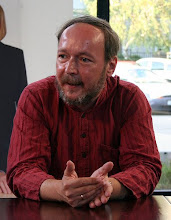
In early September I have already raised my concerns about the Global Mental Health Movement. Now there are new developments which, unfortunately, seem to confirm my worries. The movement launched its website. According to it:
The Movement for Global Mental Health aims to improve services for people with mental disorders worldwide. In so doing, two principles are fundamental: first, the action should be informed by the best available scientific evidence; and, second, it should be in accordance with principles of human rights. The Movement is a global network of individuals and institutions who support this mission.
The Movement has emerged from the recent Lancet series of articles on Global Mental Health. Its goal is to implement the final Call for Action article of the Series which demands the scaling up of treatments for mental disorders, for the human rights of those affected to be protected, and for more research in low and middle income countries. We believe that the Movement for Global Mental Health will facilitate a vigorous and sustained response to the Call for Action. Furthermore, the Lancet will designate mental health as one of its ‘campaign focal points’ in the coming years. Ultimately we aim to ensure that, through a range of activities, the Movement for Global Mental Health takes its place alongside those promoting HIV/AIDS treatment and maternal and child survival, and is identified as one of the great public health successes of our times.
The Movement has set up an advisory group. This consists of 57 experts. Let us make a little statistics. 3 of the 57 members come from the user community, which is 5.3 per cent. 27 experts represent the academia, mostly biomedical psychiatry, this constitutes 47.4 per cent. 31.6 per cent of the advisory group come from low income countries. I hold there is no need for comments to see the predominance of first world professionals in a movement that is supposed to prioritize the needs/interests of the users and of the developing world.
The material available on human rights starts with a reference to the UN Mental Illness Principles, which is an outdated document, heavily criticized by both the user community and increasingly by the UN human rights mechanisms also. There is no reference to human rights violations caused by psychiatry itself, no mention of informed consent. The UN Convention on the Rights of Persons with Disabilities is just mentioned, nothing substantive is written about its content. This is even more surprising in the light that the majority of the countries who have ratified the convention are developing countries, the supposed priority area for the Movement. Hardly any human rights information comes from the developing world.
This is sufficient to summarize: the launch of the website and the steps taken since my previous blog entry are highly discouraging.

1 comment:
Thank you for the statistical analysis of the advisory committee. As you are probably more familiar with the background of most of the people seated there can you also adivse us how many people on this board have a background in human rights or anti-discrimination law advocacy?
Post a Comment